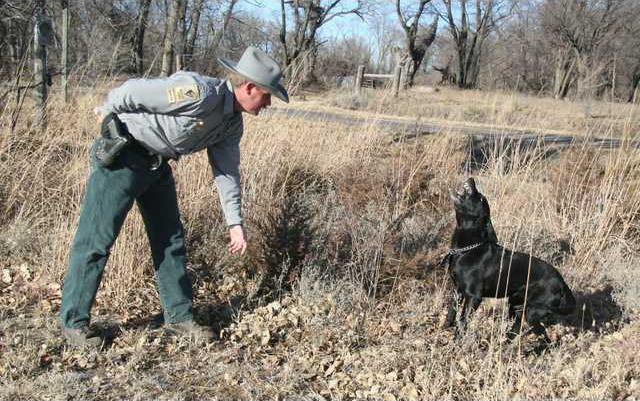HOISINGTON — Officer Allie is retiring after a long and productive law enforcement career. Her bosses hope to find a replacement that’s equally skilled at tracking bad guys, finding hidden evidence and greeting hundreds of school kids with a wildly wagging tail.
The 9-year-old Labrador retriever is one of several that will soon retire from the Kansas Department of Wildlife and Parks canine program.
The agency is asking the public to donate dogs to be paired with two game wardens. Both will soon spend about two weeks in Indiana undergoing special training.
"We’re looking for Labs around 1 year old and with good drive," said Jason Barker, a game warden who helped start the program in 2003. "A lot of times that’s the dog somebody wants to give up because the dog’s always digging or chewing. It’s that drive that makes them trainable and good in the field."
Game warden Brian Hanzlick, Allie’s handler, said she came from a Russell County home.
"She chewed up everything in sight and was really high-strung," he said. "She just needed a job and she’s done it pretty well."
Dogs are ‘a great tool’
The department made a similar request for dogs in 2003. The result was a starting canine force of five dogs. Financial contributions were also solicited to help fund the program and are still accepted.
Wardens say it has been well worth the time, money and dogs donated.
"They’re a great tool in the field that have helped us make hundreds of cases," Hanzlick said. "They can do in a few minutes what might take us hours or days if we can even do it. I joke that if Allie could drive I’d never have to leave the house."
Barker said dogs and wardens will learn to work together on tracking, wildlife detection and evidence recovery during their training in Indiana.
The two game wardens chosen for the program were picked from about seven applicants. Three dogs will accompany them to Indiana. The department will find a good home for the one not used, or return it to its owner.
Once trained, the dogs will be near-constant companions of the game wardens, riding in special compartments in the cabs of their KWPD trucks.
They wear a badge when on duty and have special protection under Kansas law.
"Ever since I’ve had her she’s had good manners in the house," Hanzlick said of Allie.
"Ever since I’ve had her she’s had good manners in the house," Hanzlick said of Allie. "She usually sleeps with one of our three boys. I think it’s a lot easier for a dog to bond with you when they’re laying beside the chair you’re sitting in."
Work in the field
Like all of Kansas’ game warden/canine pairs, Hanzlick and Allie have logged thousands of hours afield.
Living near the Cheyenne Bottoms marshes, Allie has used her sensitive nose to find scores of ducks stomped into the water and mud by poachers who have shot more than their legal limit.
Hanzlick estimates the dog has found about 100 carcasses of deer shot by poachers. Evidence from the deer, such as DNA, has been used to help make solid cases.
Locating the empty cartridges from rifles used in poaching is another common job.
The dogs and handlers also work closely with other law enforcement agencies.
Allie has helped find weapons used in stabbings and armed robberies.
Another department dog tracked and found a drug dealer that was considered dangerous.
The dogs are not trained to attack people. In fact, their dispositions lend well to other important duties.
Hanzlick said he and Allie have done about 20 public demonstrations and programs a year.
At presentations, he often put Allie through her paces by hiding things like cartridges or things with human scent.
On things like a hidden duck or goose, she’ll retrieve it directly to her handler. If it’s something too small or too large to be picked up and carried, like a pistol cartridge or deer carcass, she stands at the spot and barks excitedly.
Hanzlick has taught Allie a few entertaining tricks. With his body movements he can get her to bark a specific number of times.
During a brief demonstration Saturday afternoon he asked, "Allie, what’s the limit on pheasants?" She barked four times.
"When I’m in the field somebody will say something about a limit of pheasants and I’ll ask her and she’ll answer with four barks," Hanzlick said. "When I’m at a grade school I may ask her what is five minus two and have her bark three times. It’s pretty entertaining and people really enjoy that kind of thing."
Hanzlick said he’s decided to leave the canine program so he can spend more time with his family.
Like most dogs retired from canine programs, Allie will stay with her handler.
"She gets to stay with me and my family. We’ll do some duck or pheasant hunting on our own for a change," Hanzlick said. "I’ve (jokingly) told my wife I want Allie to be buried with me someday. We get very close to these dogs."
Anyone interested in donating to Wildlife and Parks’ canine program can call Jason Barker at 316-729-0070.





